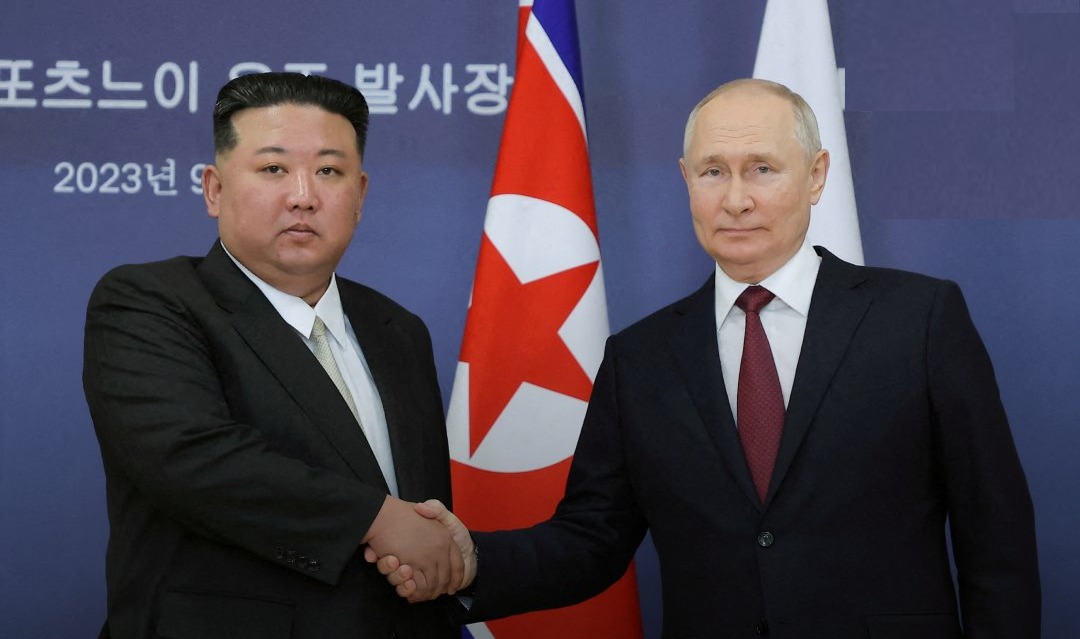On June 20, 2024, Russian President Vladimir Putin & North Korea’s leader Kim Jong Un signed the Comprehensive Strategic Partnership Treaty.
President Putin’s state visit to North Korea and the signing of the security treaty de facto welcomed North Korea back into the Global community. The Western world, which will surely be rattled by this development, will, however, dismiss it, perhaps referring to the alignment as ‘The Axis of Greater Evil’ or some such nonsense.
Western derision notwithstanding, the treaty represents a tectonic shift in global alignments, and eventually, India will have to factor it into its foreign policy. We will discuss that later.
As per the treaty, North Korea and Russia will immediately provide “military and other assistance” if either of them is attacked. The treaty resurrects a 1961 Soviet-era pact that was scrapped after the collapse of the Soviet Union.
The details of the new pact have not been publicly disclosed yet.
Putin and Kim also agreed to take joint measures to strengthen their defense capabilities and expand cooperation in trade and investment. The treaty will be effective indefinitely until either of them seeks its expiration.
Impact Of Treaty
President Putin has already said that he could transfer high-precision weapons to North Korea in response to Western military assistance for Ukraine.
“We reserve the right to supply arms in other regions of the world,” Putin said at a press conference in Hanoi on June 20. “Bearing in mind our agreements with the Democratic People’s Republic of Korea, I don’t rule this out.”
Bloomberg quotes him as saying, “Westerners give arms to Ukraine and say ‘we don’t control how they are used afterward.’
“We can also say the same.”
Earlier, during the second part of his speech at SPIEF, which was devoted to security issues, he had said that Russia would provide weapons to countries opposed to the West just as the West had supplied weapons to Ukraine to attack Russia.
If unfriendly countries supply weapons to a combat zone and call for the use of these weapons on our territory, why then do we not have the right to respond to this in a mirror?
A big gain for North Korea from the security pact would be that Russian vetoes will now block UNSC resolutions targeting North Korea.
The biggest gain, of course, would be that the treaty will deter US/NATO military action against North Korea. (The Trump administration reportedly contemplated a sobering military strike against North Korea!)
If, in the future, Russia were to transfer S-400 systems to North Korea, North Korea could pose as much of a threat to the US as the US can pose to it, something that the US would be highly uncomfortable with.
Russia, too, will gain substantially from the revival of the Soviet-era bonhomie with North Korea.
South Korean Defense Minister Shin Wonsik told Bloomberg that North Korea has already supplied Russia with millions of artillery shells and scores of ballistic missiles in support of the SMO.
The contention is supported by satellite photos of shipping container movements from North Korea to Russia. North Korea and Russia, however, deny the allegation.

Deterring NATO Interventions
The possibility that other Global South nations like Iran and Yemen could enter into similar security pacts with Russia in the future cannot be ruled out.
US unilateralism is most often enforced through NATO under the guise of protecting democracy or preventing humanitarian crises. NATO’s campaigns in Iraq, erstwhile Yugoslavia, Afghanistan, Libya, and the Mediterranean Sea are examples.
It’s logical for nations that face a threat of NATO intervention to enter into a security alliance with Russia. In the past, Russia would have turned down such a request since it believed in a global order and international law. Not anymore!
Russia’s Point of View
Russia itself is dealing with an existential threat from NATO. From its point of view, how could it possibly go wrong by aligning with other nations that perceive a similar threat?
It’s likely that Russia, aware that its SMO in Ukraine could last many years, is wary of depending solely on China. Russia is likely mindful that China will not vitiate its relations with the US beyond a point. So, there is little chance that China will supply military hardware to Russia in the future if Moscow begins to feel the squeeze.
India’s Dilemma
Russia is being pushed into a corner and forced to rely on nations that India is uncomfortable dealing with – China and North Korea being examples.
The world is becoming sharply polarised. The unfolding events will surely challenge Indian diplomacy and foreign policy. Much will depend on whether the world shifts from unipolarity to bipolarity or multipolarity.
It would be in India’s interest to steer the world toward multipolarity, which India has consistently advocated. It’s time for India to get off the fence because there can be no fence in a multipolar world.
- Vijainder K Thakur is a retired IAF Jaguar pilot, author, software architect, entrepreneur, and military analyst.
- VIEWS PERSONAL OF THE AUTHOR
- Follow the author @vkthakur




